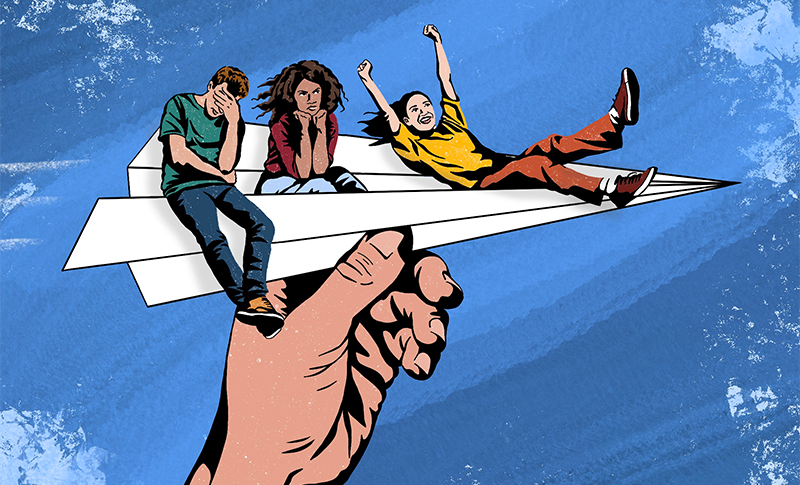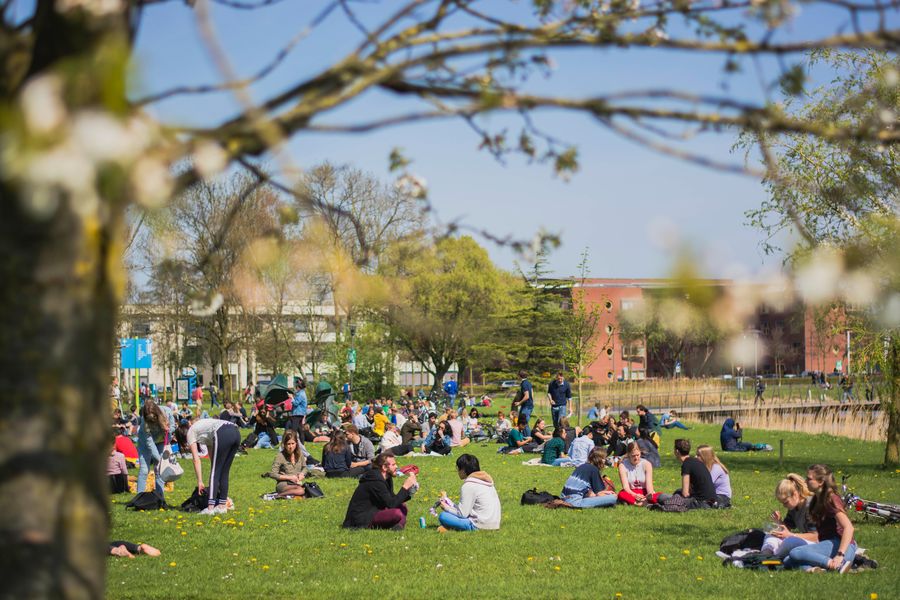PhD trips are an important part of their programme for many PhD researchers. The trips are seen as educational and a way of bonding with each other, and some of them go back a long time. But how useful and how ethical is it for 20 people to fly off to visit overseas laboratories? ‘It’s about weighing up the benefits against the environmental costs’.
WUR staff do a fair bit of flying to maintain their international networks. In 2018, almost a quarter of WUR’s carbon footprint still came from air travel. There has been much discussion about which trips and forms of transport are really necessary – on student field trips, for instance – and the decisions reached vary widely. The same thing goes for PhD researchers within the departments and the graduate schools, who have always taken trips abroad to visit other research groups and companies. It is argued that you learn a lot from such travel, and that it broadens the mind and fosters a team spirit in the group. But can it be justified in these times? When this question was put to all the Wageningen graduate schools, we got a variety of responses.
The clearest and most limiting policy was found – unsurprisingly – at WIMEK, the graduate school for environmental and climate scientists. WIMEK does not want its PhD researchers to travel by plane. Beyond that, they point us in the direction of the individual chair groups, as do most of the graduate schools. That is where the final decision is usually made.
Local farmers
Claudius van de Vijver, head of the PE&RC (Production Ecology and Resource Conservation) graduate school, says he can’t think of many examples of jointly undertaken trips by a chair group in which the researchers travel by plane – except for the international courses run by PE&RC. They usually do entail flying: a course in Africa in order to see the local farming systems, for example. ‘That helps us to really study and understand the local problems. We are an international university and we study international issues. A clear picture of the local situation is important. But of course we are judicious about it too. Flying is not always the only option, and then we look for alternatives. It is no longer standard practice to fly in a teacher from America to give a single lecture.’
Flying in a teacher from America to give a single lecture is no longer standard practice
There are similar discussions at WASS – the Wageningen School of Social Sciences – although here PhD trips seem to be the exceptions that prove the rule. Marieke Meesters, who got her PhD in WASS last September, raised the issue when she was invited by the Environmental Policy department to join a PhD trip. The destination was still being debated. ‘Brazil was one of the favoured options. Even though I wasn’t planning to go along, I did pose the question of whether that was acceptable nowadays. The response varied. I am quite an activist and outspoken on this kind of subject.’ Her question had an impact, and the group ended up going to Sweden.
Meesters didn’t miss the experience of a PhD trip. ‘I did benefit a lot from writing retreats. Working on articles with other PhD researchers at a nice location in the woods near Utrecht. That is useful and good for bonding.’ But she doesn’t assert that flying can never be an option. ‘I’m working now on a research proposal on making good use of human faeces. In Japan they have experience with good installations for doing that. So I’m weighing up the pros and cons of flying out there, getting an expert to come here, or doing it all through online meetings. It’s about the balance between the benefits and the environmental costs.’
Social cohesion
The strongest tradition of PhD trips is found at VLAG, the graduate school for the Food Sciences group. For some of the chair groups, the tradition goes back 30 years, and ‘knowledge exchange and the strengthening of social cohesion are always a goal,’ says Vesna Prsic of VLAG.
But this didn’t stop Dolf Weijers, head of the Biochemistry group, from deciding that the concept didn’t apply to his group. ‘I can well understand that it’s useful for some groups because the research topics of the PhD students are closely related so the international visits are relevant to many of the researchers. In our case, the topics studied by PhD researchers are quite diverse and they come under two different graduate schools. Taking everyone on the same PhD trip would mean that half the researchers would not find it particularly useful. Instead of an expensive and time-consuming trip, I see more use in supporting the PhD researchers in making individual trips to other institutes and conferences.’
We offer our PhD researchers other social activities, such as a joint retreat
But then you forego the social benefits. ‘That’s very valuable, of course, so we offer our PhD researchers other activities, such as a joint retreat. But I don’t really have an opinion on this that applies beyond our own group,’ concludes Weijers.
The Food Quality and Design group is going on a trip this year: 26 researchers, including three senior supervisors, are off to Mexico. PhD researcher Tomer First is one of the organizers of the trip, and it will be his first trip. ‘Most PhD candidates go on just the one trip, actually, even though there is a trip every two years,’ he says. ‘And we alternate between a trip within Europe and one further afield. Mexico is interesting because they do a lot of innovative food research there. But the research culture is very different to the one in western Europe, and that is an eye-opener for us. And accommodation is relatively affordable there.’ They will be visiting two regions of Mexico, with slightly more visits to academic labs than to companies. ‘And we will be holding a mini-conference, with posters and presentations, so that we delve into the subject matter together.’ First feels there’s a good balance between benefits and the environmental impact in this plan.
Japan or Scandinavia
PhD researchers at Microbiology will be flying this year too. They are going to Japan in October to visit research groups and companies. In this case too, the researchers are organizing the trip themselves. And in theory they only join one trip during their PhD period. ‘With the exception of the people who organize a trip,’ explains Nico Claassens, associate professor in the graduate school. Costs and time play a role there, he admits. Staff have to cover some of the costs themselves. Claassens understand the dilemma for junior researchers. ‘There are PhD researchers for whom the trip is a once-in-a-lifetime chance. Some of them take the opportunity to have a holiday after it.’
In the run-up to the next trip, the organizers investigated three options, including two European destinations, Scandinavia and the UK. After a vote, the decision was Japan. ‘You make a decision for the whole group,’ says Claassens. ‘If someone takes a different view of it, they still have to go with the majority decision.’ Claassens himself went to the United States twice as a PhD researcher. ‘Now I was invited to go along as a supervisor. I turned it down, as I see it differently now.’
But he does have positive memories of his own trips as a PhD researcher. ‘It really is a high point of your PhD period. The atmosphere and the relationships you build really are unique. But you can do that perfectly well in Europe.’
For himself, Claassen weighs up case by case whether he travels and how. ‘Two years ago I went to a conference in the US to talk about my work. But for other conferences last year I decided just to give a talk online.’ So how should chair groups deal with this issue in future? ‘Maybe we should establish guidelines on how to make a decision. But what you would really like is for PhD researchers to start thinking differently about this. I have noticed that it’s already become easier to put it up for discussion.’

 Illustration Valerie Geelen
Illustration Valerie Geelen 

